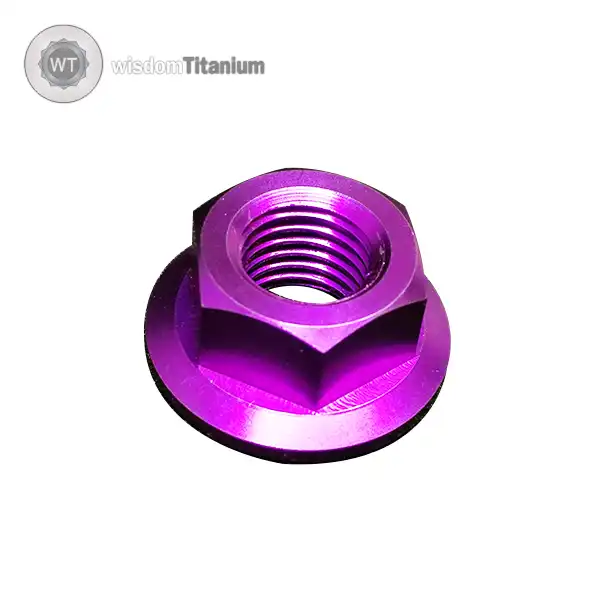
In the realm of fastening technology, the role of nuts cannot be overstated. These small yet crucial components play a pivotal role in ensuring the structural integrity of countless assemblies across various industries. Among the plethora of nut varieties available, titanium hex flange nuts stand out for their exceptional performance and reliability. But what sets them apart, and how do they ensure secure fastening? Let's delve into the science behind the products and their contributions to robust assembly solutions.
Understanding Titanium: The Metal of Choice
Titanium is a highly regarded transition metal known for its remarkable characteristics. With an exceptional strength-to-weight ratio, corrosion resistance, and biocompatibility, it has become the metal of choice in several industries, including aerospace, automotive, marine, medical, and others where durability and performance are crucial.
Now, let's turn our attention to the products. These nuts, crafted from titanium, inherit the metal's exceptional traits. Their hexagonal design provides a secure grip and facilitates easy installation and removal. Perfect for applications where high strength and corrosion resistance are essential, titanium hex flange nuts offer a dependable solution.
In aerospace, the products play a critical role in securing vital components, ensuring safety and reliability in aircraft structures. Similarly, in the automotive industry, these nuts aid in lightweighting vehicles without compromising strength, thereby improving fuel efficiency and performance.
The marine sector benefits from the outstanding corrosion resistance of the products, making them ideal for marine equipment exposed to harsh saltwater environments. In the medical field, where biocompatibility is key, these nuts find use in implants and surgical instruments, ensuring compatibility and reducing the risk of adverse reactions.
Overall, titanium hex flange nuts epitomize the versatility and dependability of titanium as a material. Their unique blend of strength, corrosion resistance, and biocompatibility renders them indispensable in various industries where quality and performance are non-negotiable. Understanding the properties of titanium and its diverse applications underscores the significance of the products in modern engineering and manufacturing processes.
The Anatomy of a Hex Flange Nut
A titanium hex flange nut is a specialized type of fastener distinguished by its hexagonal shape and integral washer-like flange. This design feature serves multiple purposes, enhancing both the ease of installation and the reliability of the joint.
The hexagonal shape provides multiple points of contact for wrenches or sockets, facilitating efficient tightening and loosening operations. Additionally, the integrated flange serves as a built-in washer, distributing the applied load over a broader area. This not only prevents the nut from digging into the surface material but also helps resist loosening caused by vibration or external forces.
Advantages of Titanium Hex Flange Nuts
-
Corrosion Resistance: Titanium's inherent corrosion resistance is one of its most celebrated attributes. Unlike steel or other metals, titanium does not rust or corrode when exposed to moisture, chemicals, or harsh environments. This resistance to corrosion ensures the longevity and reliability of assemblies even in challenging conditions, such as marine or aerospace applications.
-
High Strength: Despite its lightweight nature, titanium boasts impressive strength comparable to many steels. This high strength allows the products to withstand substantial loads and stresses without succumbing to deformation or failure. Whether securing critical components in an aircraft or anchoring structures in offshore environments, titanium hex flange nuts provide the strength necessary for demanding applications.
-
Weight Reduction: In industries where weight savings are paramount, such as aerospace and automotive, every gram matters. Titanium's low density enables the design of lightweight assemblies without compromising structural integrity. By utilizing the products, manufacturers can achieve significant weight reductions while maintaining stringent performance requirements.
-
Temperature Resistance: Titanium exhibits exceptional thermal stability, retaining its mechanical properties over a wide temperature range. This makes the products ideal for applications subjected to extreme temperatures, such as engines, exhaust systems, and industrial machinery. Whether exposed to scorching heat or freezing cold, titanium maintains its reliability, ensuring secure fastening under challenging thermal conditions.
Applications Across Industries
The versatility and performance of titanium hex flange nuts render them indispensable across various industries:
- Aerospace: From aircraft fuselages to propulsion systems,the products play a vital role in aerospace applications where lightweight, corrosion-resistant fasteners are essential for safety and performance.
- Automotive: In the automotive sector, the products contribute to weight reduction initiatives, enhancing fuel efficiency without compromising vehicle durability or safety.
- Marine: The corrosive nature of marine environments necessitates the use of corrosion-resistant materials like titanium. Hex flange nuts made from titanium provide reliable fastening solutions for marine structures, vessels, and offshore equipment.
- Medical: Titanium's biocompatibility and corrosion resistance make it a preferred material for medical implants and devices. Hex flange nuts manufactured from titanium ensure secure fastening in surgical instruments, prosthetics, and orthopedic implants, where reliability and biocompatibility are paramount.
Conclusion
To sum up, titanium hex flange nuts are the optimum in attaching technology since they give you an unrivaled combination of strength, resistance to corrosion, and trustworthiness above what is available today. Their innovative design and superior performance make them indispensable across a spectrum of industries, from aerospace and automotive to marine and medical.
By harnessing the unique properties of titanium, these fasteners ensure secure and durable assemblies in the most demanding environments. Whether soaring through the skies, navigating the seas, or advancing medical science, the products provide the foundation for innovation and progress.
If you want to learn more about the products, welcome to contact us: sales@wisdomtitanium.com.

References
-
H. Kong, M. Rahman, A. Morshed, "A Review on the Recent Advances of Key Titanium Alloy Development for Aerospace Applications", Materials 2021, 14(14), 3854.
-
J. Li, Y. Gao, Z. Lai, "Aerospace Applications of Titanium Alloys—A Review", Aerospace 2019, 6(9), 97.
- ASTM International, "Standard Specification for Titanium and Titanium Alloy Bars and Billets", ASTM B348-19e1.
- R. Boyer, "An Overview on the Use of Titanium in the Aerospace Industry", Materials Science and Engineering: A, Volume 213, Issues 1–2, 1996, Pages 103-114.
- L. Zhang, Y. Wang, Y. Liu, "Advances in Fatigue and Fracture Behaviors of Titanium Alloys", Fracture 2022, 4(1), 245-261.





